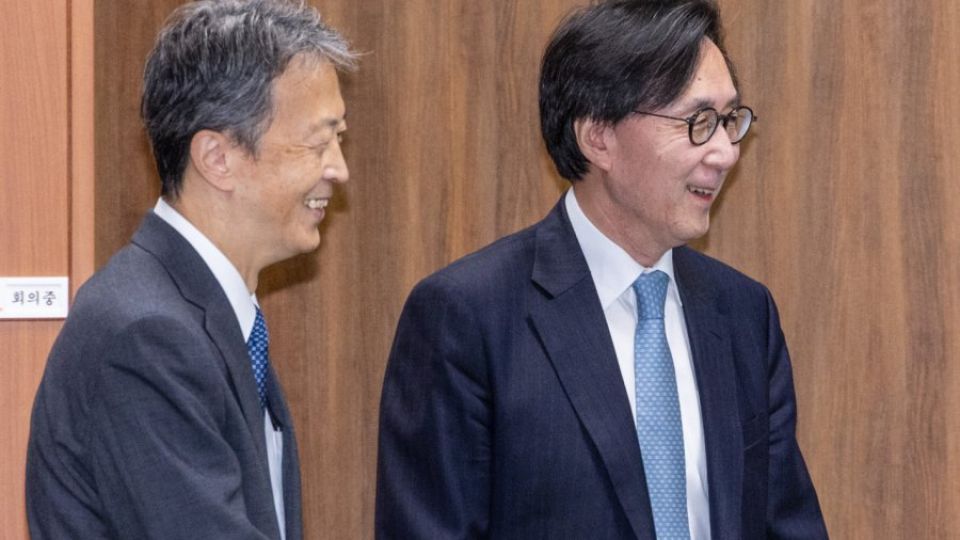October 6, 2023
SEOUL – South Korea and Japan restored vice-ministerial diplomatic channels for dialogue in Seoul on Thursday for the first time in nine years, in one of Seoul’s latest gestures toward improving ties with Tokyo.
South Korea’s First Vice Minister of the Foreign Affairs Ministry Chang Ho-jin met with Japan’s Vice Foreign Minister Masataka Okano in a closed-door meeting at 10 a.m. to seek ways for strategic cooperation, as the bilateral relationship is thawing, the government said in a statement.
The two-hour meeting was followed by a luncheon, as senior Foreign Ministry officials of the two countries condemned North Korea’s nuclear and missile threats and agreed to stern actions against any provocations and to address human rights issues in North Korea, according to a senior ministry official.
Also, dialogue centered on ways to strengthen trilateral ties between Seoul, Tokyo and Washington as well as between Seoul, Tokyo and Beijing, the ministry official added. The two countries also exchanged views over Indo-Pacific strategic initiatives, as well as security challenges in Ukraine and East Asia.
A Foreign Ministry spokesperson told reporters that the revived dialogue could lead to “enhanced cooperation over mutual interests based on closer communication between South Korea and Japan.”
Okano also met with Seoul’s Foreign Minister Park Jin for 20 minutes the same day.
The vice ministers’ meeting constituted the first high-level talks between Japan and South Korea to discuss bilateral, regional and international affairs since October 2014. Regular meetings were established in 2005.
Seoul has held such high-ranking talks with the US, China, the European Union, Vietnam and Indonesia, according to the Foreign Ministry. But talks between Seoul and Beijing have remained stalled over the past decade, a Foreign Ministry official said.
Seoul emphasized that this action follows the summit held in Tokyo in March between President Yoon Suk Yeol and his Japanese counterpart, Prime Minister Fumio Kishida, during which both nations committed to moving forward and setting aside historical issues to address increasing security challenges in East Asia.
Before Yoon came to office, bilateral ties between Seoul and Tokyo had frayed due to historical disputes over Korean victims of forced labor and sexual slavery during Japan’s colonial rule of the Korean Peninsula from 1910-45. The two countries have also been at odds over the sovereignty of South Korea’s easternmost Dokdo islets, which Japan also claims.
But since his inauguration in 2022, Yoon has expressed a commitment to improving bilateral relations, which has yielded seven meetings between him and Kishida, including Yoon’s visit to Tokyo and Kishida’s visit to Seoul in the first such instance of “shuttle diplomacy” in 12 years.
On the other hand, Korea’s liberal opposition has criticized Yoon’s cozying up to Japan without settling the historical disputes as “humiliating.” Yoon in March, after a landmark summit with Kishida, said there “still exist forces that shout exclusive nationalism” merely to “take political gains.”
Thursday’s landmark high-level dialogue comes in line with the revival of senior-level security talks between the two countries known as the Security Policy Consultation, which were restored in April after a hiatus of five years, in the face of North Korea’s growing nuclear threats.
Seoul has also been working to normalize the intelligence-sharing General Security of Military Information Agreement, which it threatened to terminate in 2019.
The restoration of key diplomatic channels for dialogue came on the same day that Fukushima Daiichi nuclear power plant operator Tokyo Electric Power Co. began its second discharge of treated radioactive wastewater used to cool the reactors of the quake-hit plant.
Another 7,800 cubic meters of water will be filtered, diluted with seawater and discharged over the course of 17 days. Before Thursday, the first discharge of 7,788 cubic meters of water was carried out between Aug. 24 and Sept. 11.
Over 1.3 million cubic meters of radioactive wastewater has accumulated and is being stored in tanks at the plant since a massive earthquake and tsunami wrecked the plant in eastern Japan in 2011.
Assuring the public of the safety of the treated radioactive wastewater and Tepco’s water treatment facility operations, Park Ku-yeon, the first vice minister of the Office for Government Policy Coordination, said Thursday that its press briefing on Japan’s contaminated water release and its impact on South Koreans’ safety and livelihoods will no longer be held on a daily basis.
Instead, daily written statements will be released, while press briefings will take place twice a week, beginning next week.
The briefing, designed to quell public fears over the release of the contaminated water, have been ongoing since June 15. Thursday’s was the 75th of its kind.
The main opposition party has ramped up criticism over Seoul’s soft stance on the issue, urging the administration to reverse course during the 45th Consultative Meeting of Contracting Parties to the London Convention and the 18th Meeting of Contracting Parties to the London Protocol this week.
Rep. Yangyi Won-young of the Democratic Party of Korea on Wednesday called on the Yoon administration to declare that Japan’s release of contaminated water after treatment constitutes an act of marine pollution in violation of the London Protocol.
Vice Minister of Oceans and Fisheries Park Sung-hoon said Thursday that Korea is poised to make an announcement regarding its stance over the issue at 4 a.m. Friday Seoul time, declining to explain further at a briefing on Thursday.


